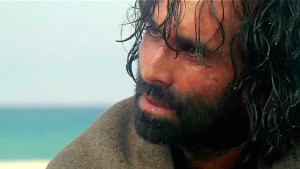
It's Jesus!
I feel like I’m in college again. There’s a deadline looming; I’m flipping through my King James Bible, searching for quotations that I can link back to a literary text… Now I’m desperately skimming through Wikipedia, trying to remember my Christian sacraments. I think, “It’s not my fault I don’t have them memorized! I was raised Jewish! Jewish! That’s a real handicap for an English major! I think that should at least earn me an extension! Shouldn’t it?”
Except there are no extensions to be had. Because I’m not in college anymore, and I’m not busy writing some nonsense about Dubliners or Paradise Lost or the boring-ass works of Mr. Edmund Spenser. (Yeah, I went there, Spenser fans. Suck it.)
No, today, I’m breaking out the Bibles because writing about Lost. Because, this week, my friends, Lost went sacramental.
So: sacraments. Obviously I wasn’t the only one who noticed Richard’s forced baptism at the hands of Jacob the Badass Baptist, but that wasn’t the only skewed sacrament we saw this week. Let’s go through them one at a time:
SACRAMENT #1: BAPTISM.
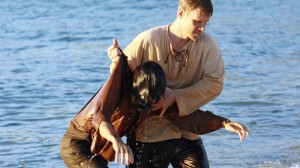
"DO YOU ACCEPT JESUS CHRIST AS YOUR LORD AND SAVIOR? WELL, DO YA, PUNK?"
In one sense, “Ab Aeterno” played the sacrament of baptism straight. Richard’s being dunked in the ocean was a moment when he was symbolically cleansed of his sins – as Jacob said, on the Island, your past doesn’t matter. On the other hand, this baptism was, well, weird. Jacob literally dragged Richard into the water and tried to drown him – repeatedly. So if Richard was “born again,” it wasn’t entirely by choice. So much for Jacob being pro-free will.
SACRAMENT #2: COMMUNION.

Take this and eat, for it is an obvious allusion.
Here’s another off-kilter version of a sacrament – Jacob gives Richard wine to drink but never says that it’s of his body (or of Jesus’s, for that matter). Rather, this wine represents evil and thus Smokey’s smoke-body. Smokey, interestingly, also gives Richard a drink in this episode, only it’s water, not wine, and Richard doesn’t take it willingly.
SACRAMENT #3: CONFESSION.
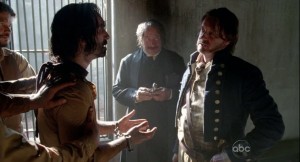
"Did you ask to be saved? See, I thought you asked to become a SLAVE. Boy, am I going to look silly at next year's priest convention!"
Here’s a really weird one. Twice in this episode, Richard tries to confess and be absolved of his sins, and twice he is rejected: first by the Bible-stealing priest back in the Canary Islands, and second by Jacob, who says he literally can’t do it. Richard’s final conversation with Ghost-Isabella also adds another fascinating layer to the confession story: she absolves him of his sin of “killing” her and says that he has he has “suffered enough.” This is interesting first because Richard didn’t even ask her for forgiveness, and, second, because she has no right to make this judgment call. (It’s not like she was ordained as a priest; how does she know that he has “suffered enough” to be forgiven?)
Then, Richard says that he wishes, more than anything, that they could be together again. Any other show or movie, at this point, would have Isabella say, “We’ll be together in Heaven,” or something similarly maudlin and afterlife-y. But that’s not what she says. She says that she is always with him—now, in THIS world. Isabella seems to be suggesting that Richard doesn’t have to worry anymore about his sins or trying to meet up with her in Heaven. The important thing isn’t being absolved by a God or a priest and getting a ticket into some exclusive afterlife, but forgiving yourself in the here and now. In general, this seems to be Lost’s main theme, a theme that basically defies Catholic dogma.
SACRAMENT #4: EXTREME UNCTION.
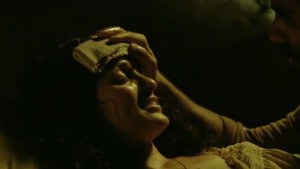
It's better than regular unction becuase it's x-treme!
We don’t actually see any real anointing in this episode, but we do see Richard applying a wet cloth to Isabella’s forehead while she’s dying. That’s basically the same thing, isn’t it? Sure, it is. Instead of calling a priest to her deathbed, though, Richard tries to stop death by getting a vial of medicine, not a vial of ceremonial oil. And, of course, he gets it by murdering a man, and he does not bring it to his wife in time. Unction fail!
SACRAMENT #5: MARRIAGE.
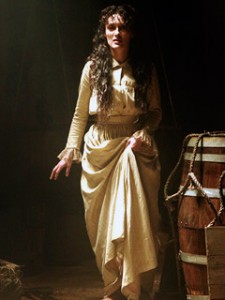
Here comes the bride, a dead spirit guide...
Although we don’t actually see Richard marrying his wife in this episode, this sacrament is indirectly alluded to throughout the episode. In Catholicism, marriage is supposed to bind two people together for a lifetime for the specific purpose of procreating offspring. Richard and Isabella thwart this sacrament in two ways: first, by not having children, and, second, by holding onto each other after “death did them part.” Awww.
SACRAMENTS #6 & #7: CONFIRMATION & ORDINATION.
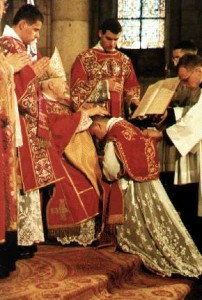
Imagine the dude on the left is Jacob and the dude on the right is Richard.
I’m going to put these two together because they are the only sacraments that are played straight in “Ab Aeterno.” By devoting himself to serve Jacob, Richard allows himself to be “confirmed” to him. Then, by “laying his hands” on Richard, Jacob is ordaining him one of his “priests,” an intermediary between himself and his congregation of Others and Candidates. (The main difference between Catholic ordination and Lost-style ordination is that the act of laying on hands in this case gives Richard the gift of immortality, not just the right to wear a cool robe or a fancy collar. So, kudos for that, Jacob.)
So we have seven sacraments, some played straight and some not. All of this, to be honest, confuses me. Why can’t Lost be clear about its relationship with Christianity? Why must it play some sacraments completely straight, others sorta-kinda straight, and still others completely inverted? This makes it hard for me to overthink, Lost writers! Can’t you throw me a bone every once in a while?
Okay, to be fair, this isn’t the first time Lost has toyed around with Christian imagery in an equivocal way. I’m sure we all recall the Virgin Mary statues filled with heroin and Mr. Eko, battle priest. And I don’t know about you, but I’m still scratching my head over the saint imagery going on in that “Fire + Water” episode.
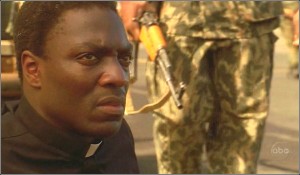
Mr. Eko: Battle Priest.
The fact is, in general, Lost isn’t clear about whether it wants to be a Christian story or not. On the one hand, we’re being shown Egyptian imagery, smoke monsters, ghosts, Dharma, and pseudo-reincarnation. On the other hand, we’re clearly being told a story about two dudes, one good and Jesus-y, and one evil and Satanic. The black and white motif, we’ve discussed, evidently points to a kind of Manichean universe, and Christianity seems to me to be the most Manichean world religion.
But, as I’ve said many times before, Lost is also a show about gray vs. gray morality, too. Jacob’s act of nearly drowning Richard in this week’s flashback shows once again that, although he may represent the forces of Good, Jacob’s not above getting his hands dirty when he needs to. Certainly all of our favorite Losties (except Sayid, now, I guess) are neither wholly good nor wholly evil, which is one of the things most of us like about the show.
So, what, Lost? Are you Manichean or not? And are you, despite all of your paeans to polytheistic mythologies, a Christian show at heart?
Even if we do accept that Lost is, purposefully or not, a Christian-themed show, I’m still not clear on what KIND of Christianity it could represent. The fate vs. free will debate—our favorite!—can easily be re-interpreted as a debate between Calvinism and more modern-day brands of Christianity. Or you can characterize the conflict between the MiB and Jacob as a conflict between Catholicism (with its focus on mortal sins and Original Sin) and Born-Again Christianity (with its focus on faith and faith alone). My old college buddy Dan—hey, Dan!—recently postulated that Jacob represents an Old Testament, Book of Job-era Satan (who accuses humanity and is kind of badass but isn’t actually evil), while the Man in Black is a conception of a New Testament, pure evil Devil. That’s fun to think about, and you can turn it on its head: to the Man in Black, the Island is an Old Testament Hell (sheol), which will never be opened purposefully—once you’re in that jail, no one’s going to open that door again, so you have somehow break your way out of it. To Jacob, if the Island must be Hell, it is a New Testament, Revelations-inspired Hell: one that will eventually be flung open for once and for all by the powers of faith and goodness (i.e., Jesus).
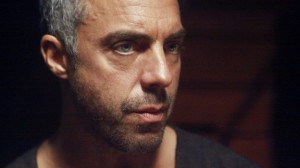
Let's throw in a picture of the Man in Black just for funsies!
Speaking of Hell, Lost also hasn’t decided what the Island represents on a metaphysical level. This week, the Island was Hell. Back in earlier seasons, we all thought it was purgatory. The folks at Entertainment Weekly had a neato theory that the Island was Israel, and that the events of season 6 were a retelling of the first Holy Week. And with Adam and Eve still rotting away in those caves (and the Smoke Monster looking kind of snake-like), the Island could still be Eden, too. Or it could even be a kind of “reverse Eden,” where people come in corrupted but end up pure and childlike in the end. We’ll have to see.
Frankly, I’m too tired to come up with any real answers to any of these questions, and I’m pretty sure, anyway, that Lost hasn’t fully answered them yet. But, as usual, it’s something to think about and return to after the season finale.
Other random notes on “Ab Aeterno”:
-
When Hurley said “Who’s Ricardus?” at the beginning of the episode, I hoped for a split second that Ilana would say, “That guy!” and we’d get a “That Girl”-like montage starring Richard as Marlo Thomas. (If I had free time and a copy of Final Cut Pro, I’d make that montage for you, but, alas, it is not to be. Use your imaginations.)
-
I am told by a very trustworthy source that no one in this episode had anything close to a real Spanish accent, and also that the Spanish translation was terrible. Also, Isabella should clearly have been called “Isabel.” So, now you know.
-
On the week that healthcare reform passes, we see a flashback about the tragic consequences of not having health insurance and a good prescription plan. Coincidence? You tell me.
-
When the Man in Black gave that sword to Richard, he said the same exact thing Dogen said to Sayid a few episodes ago: Just kill him. Don’t hesitate. Don’t let him say a word. Is this just another example of the Lost writers having fun at our expense, or is there really something special about that sword that only works if used before its victim speaks?
[Lost: Christian? Not Christian? Make your case in the comments section below!]
WELL, ACTUALLY while they don’t have a Castillian Spanish accent, Canarian Spanish is much closer to Latin-American or Caribbean Spanish than to Castillian Spanish. Their accents weren’t exactly flawless, but i thought they were more than acceptable. In fact, Richard’s accent actually seemed pretty close. Then again i’m judging by today’s standards, i have no idea how were they speaking there in the mid-late 19th century, but i’d say that it wasn’t even close to the worst portrayals of Spanish/Spaniards/Spain on record (PROTIP: try watching anything set in spain with a native. On second thought, don’t).
HAVING SAID THAT what bugged me was they learning english to get to the States, rather than, i dunno, just going anywhere south of Rio Grande, say Venezuela or Cuba, just like about everyone back then and there.
But yeah, awesome ep. Best one in a while
Re: the accent – Nestor said in the last podcast that their research indicated Canarian spanish was pretty much in-line with Cuban… so he didn’t really do anything to make it “special,” just spoke with his natural accent.
Also, I thought Jacob just really wanted the money, Lebowski! (Though to strengthen the reference, I guess it should have been nihilistic Smokey dunking Richard’s head in the Black Rock latrine… but then it would have been the wrong actor. Can’t win ’em all)
In keeping with the color palette of Lost:
– the doctor who Richard kills: dressed in black
– the priest who sells Richard into slavery: dressed in black
– the medicine to help Isabella: white grains… almost like magic white ash
So if anything, Smokey’s bad, because he’s in the same shades as those who would let Isabella die. (I think we already knew that, but…)
Finally, I think the island just “is” — based on my (overlong) post in the Open Forum for this episode, it was the island and Jacob/Smokey that would inspire the religions of the ancient world. They’re just natural forces, and it was the early Egyptians, then Greeks, who would give them meaning in their own stories. The island isn’t Eden… but it inspired Eden in the Bible, etc.
Regarding Isabel/Isabella, if sports has taught me anything, and it has taught me several things, it is that just because you might not be spelling a name technically correctly, or that you are making a name up entirely, that doesn’t mean it will stop people from doing it. Clearly, somebody was just ahead of the curve.
That’s all I have, since I don’t watch Lost.
Speaking to your point about whether Lost is Manichean, I’d go so far to say at this point, that MIB and Jacob are Manichean characters who see the world in very precise terms – good/evil. But the series wants to gray their predicament/battle by making them both look kind of like jack asses. I’m not sure it’s successful yet in doing this, but I’m willing to see what happens.
I think your friend Dan is on to something. MiB called Jacob ‘The Devil’, and really, he’s not in the habit of lying in his MiB form, as he never denies his smoke-like homicidal tendencies. At this point I see Jacob as a practical-minded warden of Hell. While he may technically be the devil, he really serves the order kept between realms. MiB just seems like a sort of demon.
Honestly though? I doubt we’ll get more explanation regarding the truth of the island or the identities of Jacob and MiB than what we received in this episode. If they do lay it all out at the end, we’ll probably be disappointed.
RE: The sword – it seems like just good advice. Don’t let him talk because he’s the damn devil and will persuade you however he chooses. After all, it didn’t have any magic power for Sayyid did it? Unless Fake-Locke spoke first, I can’t remember.
@BWNNN: yeah, actually Smokey said “Hello, Sayid” before the unlucky Iraqi did the deed. We’ve never yet seen the “Stab them in the chest before they can speak” thing work… probably because it’s damn near impossible.
@Chris: Like Favre? ::cough:: ;)
Re: Isabella- Before she dies, she tells him they’ll always be together, so I actually thought her ghost-answer was because of that. As if she was saying, “Remember what we used to say, honey? It’s true.”
And I don’t think it was murder, per say. I’d call it manslaughter. It wasn’t on purpose, and while it was a crime of passion, the intent wasn’t death. If he had shot him, maybe, but they were tussling and the doctor’s head hit the table. (I’m being nitpicky because I heart Richard so much.)
And here’s how I view the sword question. I see the sword itself as a red herring. It’s pretty, it’s nice, it has the potential to be chock-full of symbolism (which I could ramble about), but I didn’t think the sword was the important thing when Sayid was weilding it, nor do I think it was this time. I think the words said by Jacob and MiB are what really matters there. That “advice” is given because Jacob and MiB know each other, and know how persuasive the other is. They’re *both* experts at saying just what a person needs to hear. Better to try and prevent the possibility of that happening. Of course, Jacob has to use an intermediary, but it’s still bascially Jacob telling Sayid to kill MiB. Plus, it’s about preventing human connections that could get in the way of the mission: avoiding any conversation with an intended murder victim keeps an emotional/psychological barrier between them and the murderer. It isn’t like murder is easy or blase for any of these people (I mean, okay, physically, it’s easy, but I’m talking deeper, here). They could have been handed coconuts or rocks to bludgeon with, and it wouldn’t have made a difference. Talking to the intended victim gives them a lot more humanity in the eyes of the potential killer.
I realize there are a bunch of ways for declaring that as bollocks, but that’s just what I was getting out of it, that the words and their meaning are more important than the object.
We are still missing Christian, the character. I am thinking he has always been MIB, and the off island sighting of him by jack was a hallucination.
I think (unless they allow you) that Jacob and MIB believe that the other may be killed if no word is spoken before hand. Dogen was probably told that by Jacob.
I’m starting to thing Jacob is Thoth (Egyptian divine record keeper — hence the lists) and MiB is Osirus (hence only being able to take the forms of the dead.
Or something like that. I think Christianity might be a red herring.